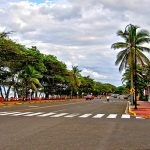Migration control that the Dominican Republic defends as a right

When President Luis Abinader recently affirmed – laughing and as if satisfied with himself – that in one week the country had deported more foreigners than the United States, he seemed to respond without fear of the consequences of growing rejections from abroad to repatriations arranged to contain the irregular flow of immigrants arriving from Haiti collapsed by gangs that with blood and fire dominate 90% of the territory of its capital Port-au-Prince.
He implicitly equated himself in self-esteem and self-confidence with President Donald Trump, who is currently lashing out with tariffs against more than half the world. He has his former allies in Europe and his bewildered neighbors Mexico and Canada reformulating their relations with the now bogged down power with more resources to impose.
It seemed easy that from January to last February, the Dominican authorities made 276,125 people who crossed the Dominican-Haitian border without legal status return to their place of origin, and the Government almost immediately had to refute in harsh terms the organization Amnesty International, a strong defender of human rights. Considering absurd the accusation of applying racist policies, the Dominican president added in his reaction that: “Amnesty has to work and do what it has to do and be a spokesperson to pacify Haiti.” He asked Amnesty to focus on other more urgent issues such as the crisis in Haiti.
Other explicit and implicit defenders of Haitians fleeing to the Dominican Republic and other destinations were alluded to in a recent papal pronouncement: Francis has said that deporting people fleeing poverty or insecurity hurts their dignity. He condemned immigration policies built on the privileges of some and the sacrifice of others. He said that denying help to migrants is a grave sin, arguing that to welcome a migrant is to greet Christ.
As if the impact of concepts issued by the Supreme Pontiff were not enough, the Dominican Episcopal Conference has made more than one call to pay attention to Haitian immigrants, inviting them to help them integrate into society and welcoming them. In addition to managing solidarity solutions to those who “are deprived of documents or are denied their basic rights,”. He said that Haitians were subject to the right to obtain the documents that correspond to every human being.
LOCAL CONSENSUS
Local opinion leaders who deal with migratory issues support, in one way or another and under different conditions, that the Dominican State protects itself against uncontrolled immigration. This is the case of digital acento.com.do, which proposed the application of a regime of consequences against the border crossing of those who do not have the documents required to enter the national territory.
The Listin Diario newspaper recently reacted editorially against any diffuse plan from abroad to impose the forced reception of refugees in the Dominican territory, urging the Government to “urge employers of labor arriving from Haiti only to hire those who have the required documentation”.
The newspaper La Información de Santiago de los Caballeros, founded in 1951, echoed last month the claims of sectors that ask for “a firmer decision to stop the uncontrollable irregular immigration of Haitians.” In its opinion, this problem will not be solved until “the Government authorities do not have the political will to defend the nation and the national sovereignty.”
The free daily newspaper Diario Libre said in the same month that the international community’s lack of concrete answers to the Dominican demand to decisively support a solution to the Haitian crisis has forced the authorities of this part of the island to implement strict migratory protocols “which are based on legality and not on discrimination.”
The evening newspaper El Nacional defended the Dominican Government against the accusation of racism issued by Amnesty International for how this country deals with the problem of undocumented immigration: “The repatriations of Haitians in irregular migratory conditions are not carried out because they are black or Anglo-Saxon, if they are, but because they violate the Migration Law which must be applied without taking into account the color of the skin of the persons affected”.
LEGAL BASIS
The General Immigration Law number 285-04 is a multifunctional tool with which the Dominican State exercises powers to authorize or deny entry of travelers and to apply it upon detection of immigrants already installed in the national territory in violation of the legal order. The application of this law is also regulated by decree number 613-11.
However, with the specification of criteria, no immigration officer can deny entries or drastically arrange departures without having verified that his decision is based on violations of the regulations governing their functions.
In cases of travelers who try to enter the country with altered documents, even minimally, the authorities located at ports of entry must issue arrest reports certifying “flagrant offense” to refer them to the Directorate General of Immigration and proceed according to the law and the application rules. Institutionally, the Dominican Republic routinely seeks to act through its legal system.
Article 130 of the law that outlines the formalities to be followed by the Immigration agents that nowadays act with remarkable continuity in interceptions of travelers, orders the D.G.M. to fill out for each case, a form with the data and information that it has been possible to obtain to record the reasons for the deportation of the foreigner. A copy of this form must be sent to the Ministry of Foreign Affairs to notify the authorities of the country of origin of the undocumented person. Lately, press releases have included photos of those caught en masse entering by clandestine means, publicity demonstrating efforts to contain illegal infiltration. The insistence of irregular penetration indicates that the usual publicity does not lead Haitians to desist from crossing the border. Nor does it stop cross-border smuggling mafias from operating.
POWERS ACT
Although global public opinion often seems sensitized by the anti-immigration hardening of Donald Trump’s presidency, the expulsion of foreigners from different territories of the First World continues to be generally accepted by political leaders and unceasingly applied by governments. At some point in recent years, the notable former Spanish Prime Minister Felipe González criticized the permanence, due to the inaction of the authorities, of half a million irregular migrants in the Iberian country.
In her good old days as Germany’s prime minister, Angela Merkel pressed her parliament to undertake a “tough but humane” asylum and immigration policy. She felt that if her country did not join other regimes in Europe in containing migration, demographic changes would badly define the old continent’s fate. Shipwrecks on fragile vessels in the Mediterranean Sea cause thousands of deaths of travelers desperately fleeing the Third World each year.
Although European legal systems are open to appeals against deportations, and repatriations have fallen by 10%, the number of proceedings initiated by authorities to remove undocumented immigrants from the continent remains high. Last year, nearly 100,000 immigrants were deported. Other data from the Eurostat entity contradict this trend, stating that in 2024, the number of returned travelers grew by 21.3%.
In the second quarter of last year, France appeared to be the European Union country that deported the most migrants. However, the drastic orders of the French authorities that the courts delayed exceeded 30,000.
But in Europe, there are thousands of immigrants trapped in the bureaucratic limbo that denies them permission to work and live in peace. This is because expulsions can be suspended in several cases: “Some people cannot be expelled due to ‘technical or practical’ barriers. For example, due to health issues or failure to identify the country of origin of those denied leave to remain. Nor is expulsion drastically applied in the case of immigrants who have been victims of human trafficking or in the case of unaccompanied minors.”
















